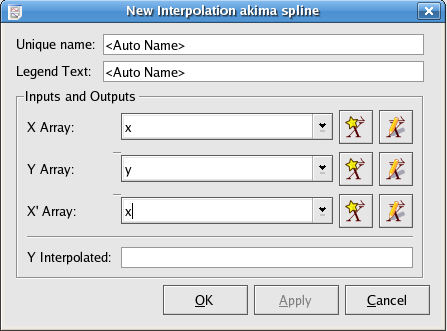

Interpolation is a way to construct new data points within a data set. All Kst interpolation plugins take two vectors x and y, and a desired values x', then find the interpolation functions which fit x and y, and evaluate functions to get the corresponding y' value (interpolated y) for each x' value.
The Interpolation Akima spline plugin generates a non-rounded Akima spline interpolation for the supplied data set, using natural boundary conditions.

The array of x values of the data points to generate the interpolation for.
The array of y values of the data points to generate the interpolation for.
The array of x values for which interpolated y values are desired.
The interpolation akima periodic plugin generates a non-rounded Akima spline interpolation for the supplied data set, using periodic boundary conditions. The input and output options are the same as those for Interpolation Akima spline.
The Interpolation cubic spline plugin generates a cubic spline interpolation for the supplied data set, using natural boundary conditions. The input and output options are the same as those for Interpolation Akima spline.
The Interpolation cubic spline periodic plugin generates a cubic spline interpolation for the supplied data set, using periodic boundary conditions. The input and output options are the same as those for Interpolation Akima spline.
The Interpolation linear plugin generates a linear interpolation for the supplied data set. The input and output options are the same as those for Interpolation Akima spline.
The Interpolation polynomial plugin generates a polynomial interpolation for the supplied data set. The number of terms in the polynomial used is equal to the number of points in the supplied data set. The input and output options are the same as those for Interpolation Akima spline.
Would you like to make a comment or contribute an update to this page?
Send feedback to the KDE Docs Team